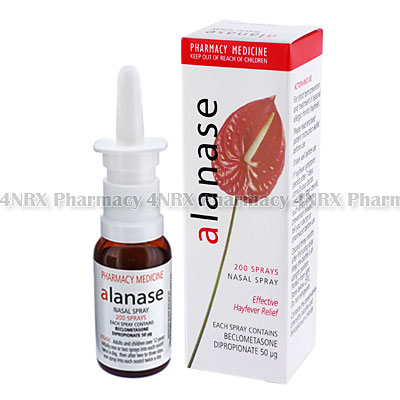 |
Home  Allergies Allergies  Alanase Nasal Spray (Beclomethasone Dipropionate) Alanase Nasal Spray (Beclomethasone Dipropionate) |
|
|||||||||
|
Alanase Nasal Spray (Beclomethasone Dipropionate) (be-kloe-METH-a-sone dye-PROE-pi-oh-nate)
What is Alanase Nasal Spray (Beclomethasone Dipropionate) used for? Alanase Nasal Spray (Beclomethasone Dipropionate) is used to help prevent and treat the symptoms of allergies such as hay fever. It helps to relive itchiness in the nose, eyes or throat, stuffy nose and sneezing caused by hay fever. This drug may also be used to treat sinusitis. This nasal spray belongs to a class of drugs known as corticosteroids, which work by helping to reduce inflammation in the nasal passages. It may also be used to prevent the growth of nasal polyps after they have been surgically removed. How should I use Alanase Nasal Spray (Beclomethasone Dipropionate)? Alanase Nasal Spray (Beclomethasone Dipropionate) should be sprayed directly into the nose, 1 to 2 times per day or as directed by your physician. Patients should blow their nose gently before use. To administer the spray, first tilt the head forward slightly, before closing one nostril with your finger. The applicator may then be inserted into the nostril, and the patient may deliver the prescribed number of sprays by pressing down gently on the pump. The patient should then inhale through the nose, and exhale through the mouth, and ensure that they do not blow their nose for 15 minutes after administering the spray. Never exceed the dosage prescribed to you by your physician. What are the side effects of Alanase Nasal Spray (Beclomethasone Dipropionate)? Some side effects which have been reported by patients using Alanase Nasal Spray (Beclomethasone Dipropionate) include:
Consult your physician immediately if any of these side effects persist or worsen, or if you notice severe nosebleeds, sores in the nose, difficulty breathing, problems with your vision or fever. Please Note Strictly follow all instructions provided to you by your physician or pharmacist while using Alanase Nasal Spray (Beclomethasone Dipropionate). Optimum and safe dosage can differ based on the patient and the condition being treated. As this medication may be unsafe for certain patients, it is essential you always inform your physician if you are pregnant or breastfeeding, as well as if you have any allergies, other illnesses, or ongoing health conditions, especially eye problems, infections or recent nose problems, and if you are taking any other form of medication, supplements, or herbal products. Patients should avoid contact with other people who have contagious infections, such as measles or influenza. You should consult your physician if you have been exposed to any infections. Prolonged use of this medication has been known to slow down a child's growth. Immediately seek emergency medical care if you have any allergic or hypersensitive reaction. Common signs of a reaction include hives, swelling, skin rashes, chest pains, as well as trouble breathing or swallowing. 

|
|||||||||||||||||